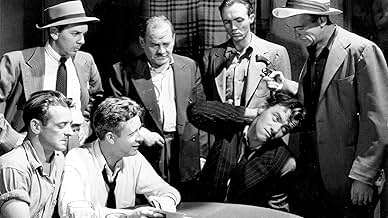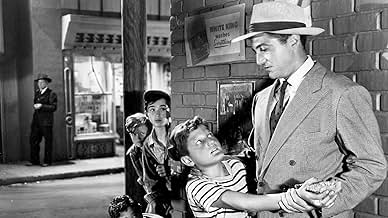Ajouter une intrigue dans votre langueNewlyweds come to visit groom's friend, only to discover him missing; and their investigation uncovers evidence of a ring of anti-semites terrorizing the neighborhood.Newlyweds come to visit groom's friend, only to discover him missing; and their investigation uncovers evidence of a ring of anti-semites terrorizing the neighborhood.Newlyweds come to visit groom's friend, only to discover him missing; and their investigation uncovers evidence of a ring of anti-semites terrorizing the neighborhood.
- Réalisation
- Scénario
- Casting principal
Tommy Noonan
- Bob - Barfly
- (as Tom Noonan)
William H. O'Brien
- Funeral Administrator
- (non crédité)
Avis à la une
An offbeat thriller,which is also a plea for tolerance and a strong indictment of ordinary anti -Semitism , shortly after WW2 (two of the characters ,including the principal ,are former army pals ; the prologue, which ends with an ominous word (guilty) , the shirt, the booklets John Ireland finds in the drawer ("he may use them to wrap up his rubbish") , and a menace hanging in the air , these criminal people always called "they" , all this makes a fine film noir.
... in its exploration of anti-Semitism in a small town.
John Ireland and Jane Randolph play a pair of newlyweds who arrive in an unnamed town and are invited to stay at the apartment of an old service buddy of Ireland's. Only the buddy isn't there (they're told he'll be back by the landlady who lets them into his apartment). But as time passes the friend is a no show and there's a growing feeling that something sinister may have occurred, especially when the couple discover some white supremacist pamphlets hidden in a drawer.
In the early stages, the film hints at the prejudice in the town, with talk about "foreigners" and "staying with their own kind". Later, though, it becomes more blatant, with "a certain word" making no doubt about the object of the hatred. That bigotry insidiously trickles down to the neighborhood kids, too, slashing the tires of a car of a Jewish merchant (George Tyne in a quite effective performance), as well as preparing to throw rocks through his window.
The film has the visual elements of noir with its shadowy photography, appropriate for such a dark subject. The overall effect of the messaging in this film is, unfortunately, rather muted. The performances are adequate but restrained. However Roman Bohnen is appropriately loutish as a drunken bigot who strikes his wife (Ellen Lowe) across the face in a tavern.
And here this little "B" briefly, and tellingly, raises another ugly subject rarely broached in '40s dramas, spousal abuse. That is never more poignantly apparent than in the dialogue Lowe later delivers to Ireland in one powerful scene:
"Tell you what? How for the last five years he hasn't drawn a sober breath? How he beats me to prove that he's better than I am? He's a man. How he throws out the few flowers I pick, says they stink up the house. How he can't keep a job? Always blames it on (others)... never on to himself. How he's broken me. Torn me to pieces. Is that what you want me to tell you?"
Dialogue like that still has a strong impact, in combination with the tired anguish of Ellen Lowe's face and delivery.
John Ireland and Jane Randolph play a pair of newlyweds who arrive in an unnamed town and are invited to stay at the apartment of an old service buddy of Ireland's. Only the buddy isn't there (they're told he'll be back by the landlady who lets them into his apartment). But as time passes the friend is a no show and there's a growing feeling that something sinister may have occurred, especially when the couple discover some white supremacist pamphlets hidden in a drawer.
In the early stages, the film hints at the prejudice in the town, with talk about "foreigners" and "staying with their own kind". Later, though, it becomes more blatant, with "a certain word" making no doubt about the object of the hatred. That bigotry insidiously trickles down to the neighborhood kids, too, slashing the tires of a car of a Jewish merchant (George Tyne in a quite effective performance), as well as preparing to throw rocks through his window.
The film has the visual elements of noir with its shadowy photography, appropriate for such a dark subject. The overall effect of the messaging in this film is, unfortunately, rather muted. The performances are adequate but restrained. However Roman Bohnen is appropriately loutish as a drunken bigot who strikes his wife (Ellen Lowe) across the face in a tavern.
And here this little "B" briefly, and tellingly, raises another ugly subject rarely broached in '40s dramas, spousal abuse. That is never more poignantly apparent than in the dialogue Lowe later delivers to Ireland in one powerful scene:
"Tell you what? How for the last five years he hasn't drawn a sober breath? How he beats me to prove that he's better than I am? He's a man. How he throws out the few flowers I pick, says they stink up the house. How he can't keep a job? Always blames it on (others)... never on to himself. How he's broken me. Torn me to pieces. Is that what you want me to tell you?"
Dialogue like that still has a strong impact, in combination with the tired anguish of Ellen Lowe's face and delivery.
"Open Secret" certainly owes a debt to "Crossfire," which came out a year earlier, but it stands on its own low-budget merits as not only a solid entry into the small field of 1940s films that dealt openly with racial and religious prejudice, but a very respectable noir thriller. The sets are simple, and there is no location footage at all -- but the director made up for that lack by using a great cast of character actors to portray some very hard-bitten men, women, and children, and, more unusually, he used sound in a dramatic way that continually moves the story forward while keeping the viewer in a state of jangled nervousness. Oh, yeah, its a very cool movie about antisemitism, of course; that goes without saying. But if you want to see it in purely filmic terms and don't care about the "message," it is equally cool. Watch for the fine low-key lighting and strange angle shots -- one of the best set-ups is Sheldon Leonard lounging akilter on a couch in his entry scene with a hugely close-up lamp and telephone in the foreground -- but also LISTEN for the doors opening and closing, telephones ringing, people screaming, sirens, noisy children, mumbling landlady, things dropping, drawers slamming; the sound effects are almost a Hitchcokian element in their own right. And pay attention to the continually changing status of the apartment door -- locked, unlocked, oops she forgot the key, locked, oops she left it open! -- there is a rhythmic and frightening quality to the door's continually shifting security status that is heightened by the always jarring sounds of intrusive door knockings and unexpected telephone rings. Considering what these folks had to work with, i think they succeeded admirably.
The opening shot is an underlit traveling crane shot, followed by an upward-tilting Dutch angle of a series of backlit faces pronouncing "Guilty." It's an open secret this film was released in 1947, when every mystery was a film noir and every decent little guy faced a faceless conspiracy.
Charles Waldron Jr. tells his landlady that his old friend, John Ireland and his new bride, Jane Randolph, will be staying with him a few days. Then he hides a roll of film in his drawer and goes out. Eventually his houseguests notice he's gone and call in police sergeant Sheldon Leonard and gradually get entangled in a web of....
It's not the most subtly plotted of film noirs, and there's little mystery about what sort of nasty people are behind the evil doings, but it's certainly beautifully shot by horror-movie specialist George Robinson, and well performed by all hands. Director John Reinhardt was an Austrian actor who had switched to directing Spanish language movies for Fox in the early 1930s.
Charles Waldron Jr. tells his landlady that his old friend, John Ireland and his new bride, Jane Randolph, will be staying with him a few days. Then he hides a roll of film in his drawer and goes out. Eventually his houseguests notice he's gone and call in police sergeant Sheldon Leonard and gradually get entangled in a web of....
It's not the most subtly plotted of film noirs, and there's little mystery about what sort of nasty people are behind the evil doings, but it's certainly beautifully shot by horror-movie specialist George Robinson, and well performed by all hands. Director John Reinhardt was an Austrian actor who had switched to directing Spanish language movies for Fox in the early 1930s.
1947 saw the debut of the film "Gentleman's Agreement" in which Gregory Peck pretended to be Jewish in order to feel what it's like to be a Jew in America. Naturally, he experiences some discrimination but it's mostly very proper ('nice' anti-Semitism) and the leading man quite handsome. It was NOT particularly gritty and I always thought the film was amazingly tame...and a bit overdone. Here, a year later, a low-budget studio had decided to do a film like "Gentleman's Agreement"--but with more normal looking folks (no handsome Peck or John Garfield here) and in a more working-class neighborhood. And, in addition, the level of hate was ratcheted up...a lot. In fact, in this sick little town, a local hidden hate group has gone so far as kill Jews! John Ireland infiltrates this group of sickies and the film lacks the pretty polish but also seems a bit more gutsy and violent. Oddly, despite the publicity for the earlier film and critical acclaim, I prefer "Open Secret" as it is much more exciting and more like a variation on film noir. A great film? No...but it certainly is interesting and the problems don't seem so mundane as those in the Gregory Peck film. As a result, it shows a seedier and uglier side to ethnic hatred.
Le saviez-vous
- AnecdotesThe soundtrack by Herschel Burke Gilbert was reworked in 1952 into a library of music cues for several TV shows including Superman (1952), Captain Midnight (1954), Sky King (1951), Space Patrol (1950), Ramar of the Jungle (1952), and Racket Squad (1950). These appear on the Original Television Soundtrack CD for The Adventures of Superman, issued in 2000 by Varèse Sarabande.
- ConnexionsFeatured in John Reinhardt: Direction Without Borders (2022)
Meilleurs choix
Connectez-vous pour évaluer et suivre la liste de favoris afin de recevoir des recommandations personnalisées
Détails
- Date de sortie
- Pays d’origine
- Langue
- Aussi connu sous le nom de
- Secret deschis
- Lieux de tournage
- Société de production
- Voir plus de crédits d'entreprise sur IMDbPro
- Durée
- 1h 8min(68 min)
- Couleur
- Rapport de forme
- 1.37 : 1
Contribuer à cette page
Suggérer une modification ou ajouter du contenu manquant



























